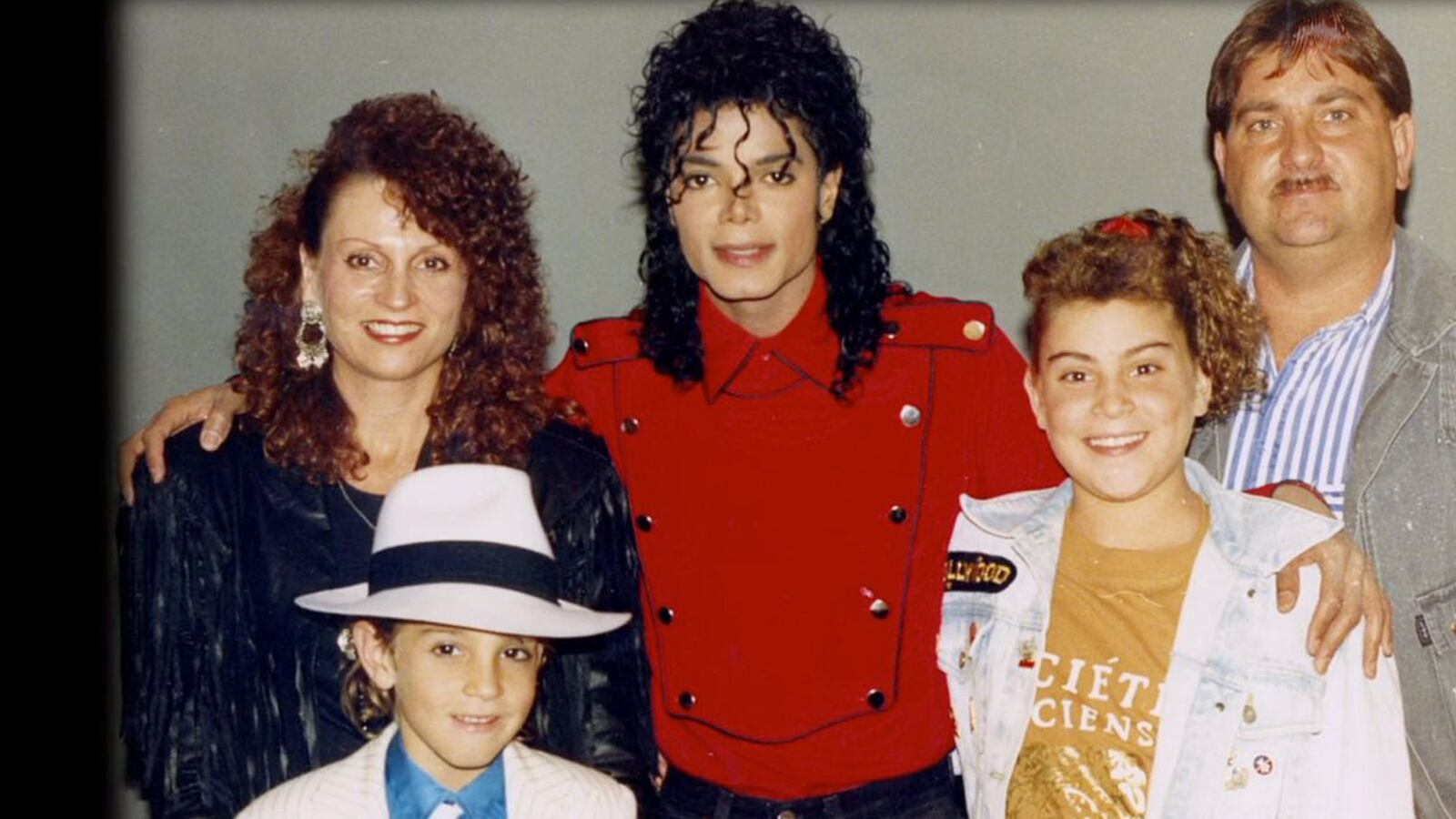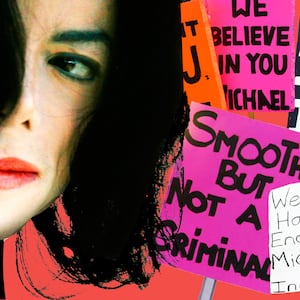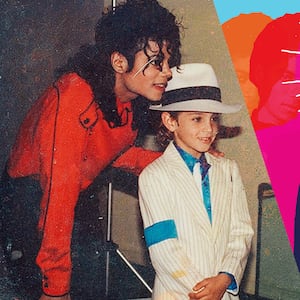Leaving Neverland, the two-part, four-hour documentary that details allegations against Jackson by two men, Wade Robson and James Safechuck, drops like a cultural bomb.
The March 3rd premiere of the HBO documentary has loomed for weeks, with the filmmakers, Jackson fans and family, and media personalities all squaring off on what this project reveals, alleges, and will ultimately mean for Wade Robson, James Safechuck, and Michael Jackson’s legacy. Oprah Winfrey is hosting a special after the documentary premieres on HBO, an interview with the two men—who have accused Michael Jackson of sexually abusing them when they were young boys. Robson, 7, was a young dancer and Safechuck a 10-year-old child actor when they first came into Jackson’s megastar orbit in the 1980s, but became estranged from the pop singer into their adolescence. Robson would go on to a famous career as an in-demand choreographer for acts like N*Sync and Britney Spears; Safechuck would struggle as an aspiring filmmaker and musician before landing a stable career in software.
The Jackson estate is suing HBO for $100 million, and released a statement slamming the documentary and the two men. “Wade Robson and James Safechuck have both testified under oath that Michael never did anything inappropriate toward them,” the statement read.
Leaving Neverland is a harrowing film. The graphic details shared by Robson and Safechuck are gut-wrenching and devastating to hear, and the emotional roller coaster both of these young boys’ families were on and would stay on for the better part of 30 years ripped them apart in a variety of ways. The mental deterioration of Robson’s father, the strain between both Robson and Safechuck and their mothers—it’s all laid bare, sometimes in agonizing detail, via interviews with the two men and their families, as well as archival footage, including the famous 1986 commercial in which Safechuck starred as a young Michael Jackson fan and Robson’s performance onstage at a Jackson concert as a precocious young MJ impersonator.
Both men state that Jackson seduced their families, and the families were indeed enraptured with the famous entertainer. Robson, along with his mother and sister, relocated from Australia to Los Angeles where they maintained a friendship with Michael, and the Safechucks frequently had Jackson as a guest in their home. The film presents both families as lost in the whirlwind that was 1980s Michael Jackson, then the most famous man in the world, and seduced by the prospect of fame for their talented children. Things become expectedly daunting, as moms Stephanie Safechuck and Joy Robson share stories of Jackson offering the families help in the boys’ careers in show business and admitting those aspirations drove wedges within the respective families, ultimately leading to Jackson eventually isolating the youngsters from their parents and siblings.
“I didn’t characterize Jackson at all in the film,” director Dan Reed told The Hollywood Reporter. “It’s not a film about Michael… The film itself is an account of sexual abuse, how sexual abuse happens and then how the consequences play out later in life.”
The easy parallel is to compare the bombshell that is Leaving Neverland to the gripping Surviving R. Kelly, which aired on Lifetime in late January and reignited scrutiny against Kelly after years of allegations that the singer engaged in various acts of sexual abuse. Kelly turned himself into authorities on Feb. 22 after he was indicted on 10 counts of aggravated criminal sexual abuse involving four alleged victims. The charges span from 1998 to 2010, and Kelly faces three to seven years in prison for each count. Public opinion on Kelly has wavered for decades, but it sharply turned immediately after Surviving R. Kelly aired: he was dropped from his label, former collaborators like Lady Gaga denounced having worked with him, and radio stations vowed to remove his hits from their playlists going forward.
But with Kelly, despite his 2008 acquittal on child pornography charges, the public never presumed innocence inasmuch as they were willing to ignore what had seemed blatant proof on black market videotapes sold in neighborhood barbershops, and what had been accepted as fact in the wake of an annulled marriage to 15-year-old Aaliyah. With Michael Jackson, the public has had to decide who and what it wants to believe.
Since the film’s Sundance premiere in early February, Leaving Neverland has been the subject of scorn, celebration and scrutiny. There were reports of applause for Robson and Safechuck at the festival, as well as a damning New York Times piece by Wesley Morris which delved into what it means to be a fan witnessing these men share their horrifying stories: “But, eventually, all the suspension reaches a logical end. You run out of hooks to hang things on. There’s a moment in ‘Leaving Neverland,’ Dan Reed’s documentary about Jackson’s alleged pedophilia, where I simply ran out of hooks.”
On the opposite end of the spectrum are the online skeptics who decry Robson and Safechuck’s motivations and respective histories with Jackson.
In 1993, at age 11, Robson was subpoenaed to testify in Jordan Chandler’s child sexual abuse case against Jackson, where he denied that any abuse occurred. That case ended after Jackson reached a civil settlement with the Chandler family for a reported $20 million.
After the controversial 2003 documentary Living With Michael Jackson, wherein the star admitted to sharing his bed with children at his Neverland Ranch compound, Jackson was investigated and charged with partaking in lewd and lascivious acts with a child under the age of 14—based on allegations made by Gavin Arvizo, who appeared in the doc and later accused Jackson of molesting him. During Jackson’s 2005 trial, Robson again testified in his defense, stating that he’d stayed at Jackson’s Neverland Ranch more than 20 times and usually slept in Jackson’s room, but was never molested.
Entertainment Weekly addressed what it believed to be Leaving Neverland’s “one-sided” presentation that ignored certain imperative parts of the two men’s histories. “The only opposing commentary in the film comes courtesy of YouTube videos, featuring wild-eyed fans berating Robson for going public with his claims,” writes Kristen Baldwin. “And Neverland all but ignores Robson and Safechuck’s lawsuits against the Jackson estate…Though Robson’s suit is mentioned in the film, neither he nor Safechuck are questioned about the ongoing litigation or their motives for pursuing it.” Baldwin acknowledges that this doesn’t disprove anything Safechuck and Robson allege in the film.
In 2013, Robson alleged that he was molested by Jackson as a young boy over a seven-year period and filed a lawsuit, with Safechuck filing a lawsuit in 2014. Once Safechuck became a father, he “began to worry that he himself would have pedophilic urges,” according to Safechuck’s 2014 complaint, cited by the Los Angeles Times. He began seeing a psychiatrist and eventually filed suit after he was diagnosed with post-traumatic stress disorder, panic disorder and depressive disorder.
Robson’s filing was past the statute of limitations on any claims made against Jackson’s estate, which left two defendants in MJJ Productions, Inc., and MJJ Ventures, Inc. In 2017, Judge Mitchell L. Beckloff ruled against Robson, finding that the two Jackson-owned corporations that remained as defendants in the suit were not liable for Robson’s exposure to Jackson. Also that year, Judge Beckloff dismissed the case brought by Safechuck.
Both Safechuck and Robson’s suits are pending appeal.
This film will not be an easy watch for anyone—nor will it be an easy benediction on Jackson’s image and legacy. There are too many opposing forces to believe that the culture won’t wrestle at length with what Leaving Neverland presents. Oprah admitted that she was stepping into the eye of a hurricane, and that storm will likely rage beyond the usual social media news cycle. But there has to be a reckoning—with the cult of celebrity, our unfettered adulation, and how both can bend our sense of decency and morality.
There was never a time when the biggest star in the world jet-setting with what seemed like an endless line of young “traveling companions” should have been endorsed or normalized. There was never a time when him admitting he slept in beds with them should have been defended. As so many fans rage against what they feel is defamation, there is a sad obliviousness to how so many allow their adoration to make them cheerleaders for behavior that would be the most crimson of red flags were it not for their fandom. What we’re witnessing across popular culture is an indictment of that culture and how regularly we’ve been willing to look the other way. Staring down dark allegations surrounding one of the world’s most beloved entertainers, you know that we won’t ever be able to look away again. Neverland never existed. We can never go back. And we shouldn’t want to.







